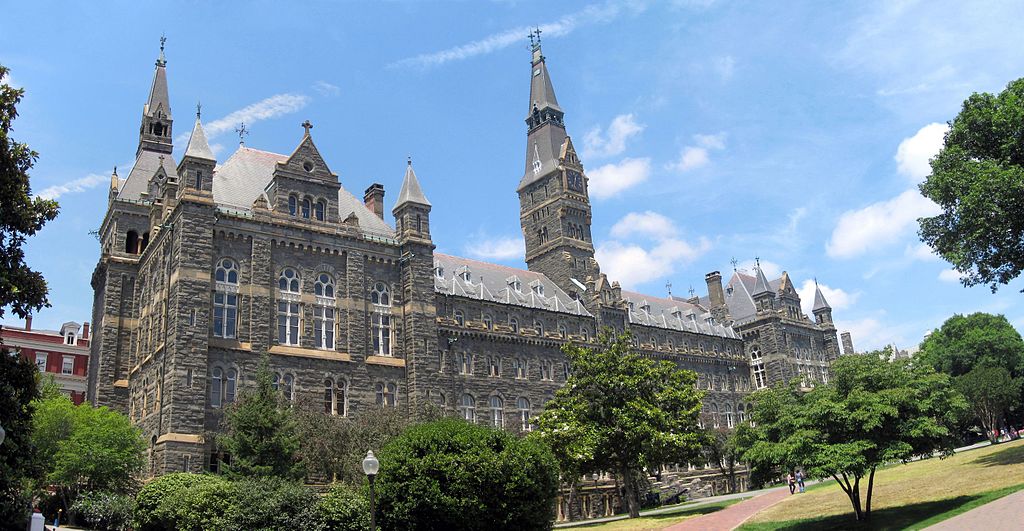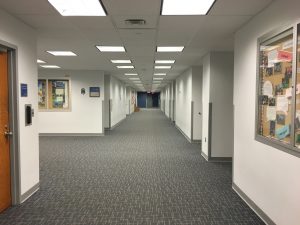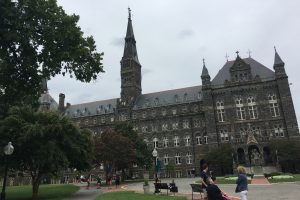An anonymous McDonough School of Business graduate student filed a class-action lawsuit against Georgetown on May 21 seeking expense repayment in light of the COVID-19 campus shut down and move to an online learning environment.
Though the motion was denied in a court ruling on account of the plaintiff’s anonymity, the lawsuit accused Georgetown of breach of contract, unjust enrichment, and conversion resulting from the semester’s transition to an online environment. The student claimed that the university had “continu[ed] to reap the benefit of millions of dollars from students” by not providing the full value of academic resources and facilities during the spring 2020 semester. The student sought over $5 million from the university to be divided amongst and distributed to all Georgetown students.
“While we do not comment on pending litigation, Georgetown University has been working to respond to this unprecedented crisis in a manner that protects the safety of our community and maintains our commitment to providing complete, meaningful and robust learning experiences for all of our students,” a university spokesperson wrote in an email to the Voice.
The suit’s premise was that by not providing its students the education they paid for, Georgetown engaged in a breach of contract and deprived the students of the worth of their tuition. To remedy this, the suit argued the university should repay students for that lost value. “There is a certain level or quality of education that is promised. Someone has to pay for it—whether it is the school or the students. In this case, it should be the schools,” Andrew Levetown, the student’s attorney, said.
Georgetown’s COVID-19 refund policy provided students with a meal plan credit and housing credit amounting to 45% of a student’s semester charges for room and board, representing the portion of the semester from March 16 onward. Those who receive financial aid from the university received refunds scaled down to the percent of costs of attendance they pay, with some students receiving no refunds. Georgetown’s refund policy for the spring 2020 semester does not include tuition costs.
The motion to proceed in the suit was denied by the U.S. D.C. District Court Chief Judge Beryl Howell on May 24. Howell wrote in the denial that the defendant had not provided enough evidence that bringing the suit under his name would pose a risk to his personal privacy that outweighed the public’s right to know.
Generally, complaints must include the name and information of both parties to be considered. Exceptions to this rule include concerns of retaliation and excessive privacy violations if the plaintiff is identified. According to the ruling, nothing personal is revealed in the complaint. While Howell acknowledged retaliation from the university is plausible, she argued the plaintiff “has pointed to nothing showing those fears are anything but speculation.”
Though the plaintiff attempted to argue that the reputation of Georgetown is not called into question by the suit, which would also give him ground to file anonymously, Howell called this claim “simply unpersuasive” as the plaintiff “alleges a major University is unjustly enriching itself at the expense of its students in the midst of worldwide pandemic.”
This ruling did not make any determination on the actual claim of the plaintiff, only on the right to file the suit anonymously. Though Levetown was not able to comment on plans following the denial, it would be possible for the plaintiff, or a different plaintiff, to refile the suit under their name.
The lawsuit against Georgetown is a part of a nationwide investigation of universities by the Seattle-based law firm Hagens Berman. Similar lawsuits have been filed on behalf of students at Brown, Duke, Washington University in St. Louis, Emory, Boston University, Rutgers, George Washington University, University of Southern California, and Vanderbilt beginning in late April.
“Hagens Berman is investigating universities and colleges across the nation and is seeking to represent students, parents and guardians against any higher education institution that has failed to repay losses due to COVID-19,” Ashley Klann, a spokesperson for Hagens Berman, wrote in an email to the Voice.
“They have lost the benefit of their bargain and/or suffered out-of-pocket loss, and are entitled to recover compensatory damages, trebling where permitted, and attorney’s fees and costs,” Klann added. The firm is seeking to represent any student who is still paying the costs of room and board or tuition.
Levetown believes that college students across the country should be defended in their right to the full value of their tuition due to the high cost of attending U.S. universities and widespread student loan debt after graduation.
“Students, when they come out of school, they have a lot of debt. They feel they can’t start families, they can’t afford risky or start-up jobs because of all the debt,” Levetown said. “The end goal is to have some sort of refund for the students for the quality of the education they got.”





